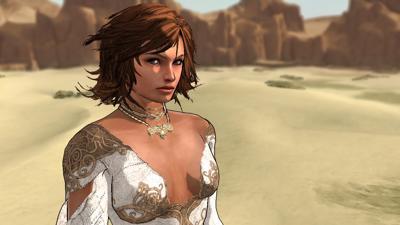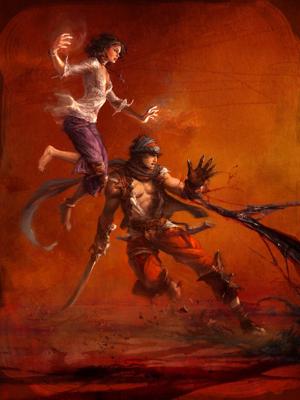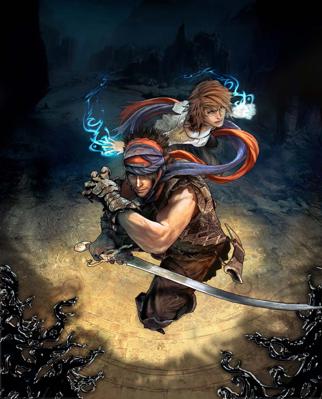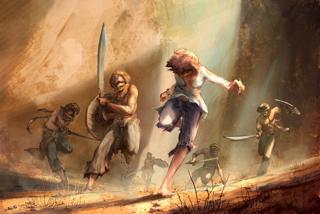The Choice Is Not Yours: Why Prince of Persia Has The Best (And Worst) Ending In Modern Video Games
WARNING: THIS ESSAY CONTAINS FULL SPOILERS FOR PRINCE OF PERSIA.
The game is called “Prince of Persia.” But it’s not really about the Prince. (He doesn’t even seem to be a prince this time. We call him “the Prince” because he has no name.) Really, the game is about (legitimate princess) Elika.

As the game opens, the Prince is lost in a sandstorm, calling out for Farah. Franchise veterans will recognize the name as that of the love interest from the Sands of Time trilogy - but it is soon revealed that Farah is actually the name of this Prince’s donkey, laden with the riches the Prince has recently looted.
It’s a nod to the previous games, but it’s also a dig at Princess Farah’s characterization and gameplay role. She was little more than a pack animal. The Prince, lost in the storm, is trying to reconnect with her, trying to return to that simplicity. Instead, he finds Elika.
“There’s this fine line where [Elika] has to be strong yet sexy; autonomous but have a certain amount of dependency on the Prince so that the player still feels like a hero. It was also really important to us that she not be treated like a sex symbol or a romantic interest. She has her own ideals and her own goals."
—Producer Ben Mattes, as quoted in Every Prince of Persia Needs a Lady
In Elika, the Prince finds an equal - if not more. Tough and spirited, she is quite able to keep up with him, both conversationally and physically. Her recent infusion of holy powers gives her magic that outclasses the Prince’s acrobatics. All the climbing the Prince can do, Elika can do too. Her teleportation and levitation provide the vital double-jump, as well as the safety net - fall too far, and Elika will grab the Prince’s hand and return them both to solid ground. Take too much damage in battle, and Elika will leap into the fray to put some distance between Prince and enemy (at the cost of the enemy regaining some health of its own). The only things, in fact, that Elika lacks and the Prince provides are a sword and a gauntlet, and these are only necessary because some enemies enter modes where they will counter all attacks that are not from a sword, or all that are not from a gauntlet, during which time Elika’s magical attacks are ineffective. In short, Elika barely needs the Prince. The Prince absolutely needs Elika.

There’s a concept called “diegesis” that means the narrative universe of a work. “Diegetic” elements are those which exist inside that universe, while “non-diegetic” ones are outside. For example, if a film shows a character listening to a song on a CD player, with the music audible to both character and audience, it is said to be diegetic. If the character stops the CD player and now the film’s soundtrack kicks in with ambient music the character is assumed not to be able to hear, that music is said to be non-diegetic.
Most death mechanics are non-diegetic. When Ratchet falls into deadly lava, or Faith misjudges a leap between skyscrapers, or Rubi takes one too many bullets, and they die and then suddenly reappear a ways back, it’s clear that this is not what has actually happened within the game’s universe. The implication is that time has rewound, in a way external to the world of the game. The death has been undone and nobody within the game has any memory of it. It is a non-event.
When the Prince begins what would be a deadly plummet, or is in danger of being killed by an enemy, Elika swoops in and saves him. This is diegetic - it actually happens within Prince of Persia’s universe. It’s not a rewind; it’s not an undo. The narrative flow is not broken. Every time it would be, the player is instead reminded of Elika’s importance as she saves the Prince’s life.
The game plays with this fact in one of its more interesting moments. During a fight with the shape-shifting, illusion-weaving Concubine, the Prince is challenged to find the real Elika among a group of illusory ones. The trick? They are all illusions. The solution? Take a suicidal leap of faith, trusting Elika to - as usual - teleport to him and pull him to safety.
If the Prince is wrong, and Elika doesn’t appear, he will die. He is willing to risk his life to get her back. After all, if he can’t find her, he is lost, and there is little point in trying to continue in a world without her. But the Prince is right - Elika appears and saves him.
I have played a lot of games, and have thoroughly internalized that death mechanics are non-diegetic. So when I was presented with this problem, I was stumped for an embarrassingly long time. It simply didn’t occur to me that the death-recovery was an actual event that could be harnessed. My friend Iceman, however, happened to be in the room. He’s played a lot of games too. But he wasn’t playing this one - he was watching it. And so he wasn’t in “game mode” the way I was, and he saw the solution immediately.

The Prince can also, whenever the player wishes, stop and talk to Elika. She quickly proves just as witty as he. She never withers, never shies, never gives an inch. She earns the Prince’s respect because she never tries to. Gradually she reveals more about herself, her past, and her kingdom. She tells stories about the places they visit - an attempt by the game writers to turn the environments from a contrived playground into the ruins of a city where people genuinely lived. The architecture is a bit too implausible for this to be completely successful, but it still turns Elika into a person with a real history.
So when Elika is evasive, the player is able to trust that it’s not because the writers left a gap. It’s because she actually is hiding something. There is an actual mystery, and it will be revealed by the end.
When exploring the royal towers, the Prince snarkily asks if he can have a tower. Elika responds that if he stays, he can have everything - the entire city. It’s a promise that comes a little too easily from a woman who usually snarks right back. It’s cryptic in its directness. She doesn’t seem to be lying, or even joking exactly, but something important is clearly going unsaid. The prince doesn’t know the right question to ask to find out what it is. But by the time the credits roll, the player will learn.
The result of all this - of Elika enhancing the Prince’s mobility and protecting his life, of her possessing unusual depth, intelligence, and strength, of her bonding with the Prince over time - is that the Prince and the player both come to genuinely care about her. The Prince, in fact, falls in love with her.
WARNING: I AM NOW GOING TO SPOIL THE HELL OUT OF THE ENDING.

As the last grounds are healed of Ahriman’s corruption, and Ahriman himself is once again imprisoned in the Tree of Life, the Prince finally realizes what Elika has known all along - to complete the ritual and truly seal Ahriman away, Elika will have to give up her magically-granted life energy and place it in the tree. Undoing Elika’s death is what freed Ahriman. Giving up her life is what is necessary to imprison him.
The Prince figures it out too late to stop her. The tree is strengthened, and Elika crumples to the ground. He cradles her lifeless body in his arms… and control is returned to the player.
There is nothing to do but carry Elika out of the temple that holds the Tree of Life. As the Prince enters the long hallway leading out, the credits begin to roll. As he reaches the end, coming to the grave of Elika’s mother just outside the temple door, the credits stop.
The normally talkative prince is eerily silent. There is a tension in the air - there has not been the release of a true climax and denouement.
Gently the Prince lays Elika down on her mother’s grave. He is then struck once more by the vision that has recurred throughout the game - Elika’s death, and the deal her father struck with Ahriman to save her.
He hesitates a moment. He strokes Elika’s hair. He reaches a decision, and steps purposefully away from the grave. The camera pans, showing the four trees that have sprung up as a result of Elika purifying the fertile grounds… and once again, control is returned to the player.
There is nowhere else to go. The other areas the Prince had previously explored cannot be accessed without Elika’s abilities. The Prince is alone and his world is empty, except for the trees.
As the Prince approaches the trees, Ahriman’s whispers can be heard. Goading the Prince. Promising things. Asking what wrong Ahriman has ever done to him. Sympathizing with the Prince’s obvious sorrow at Elika’s death. The Prince remains silent.
Each of the trees requires a bit of platforming to reach - made more difficult by Elika’s absence. As the Prince climbs to each and cuts them down, corruption spreads in the area where it stood, and Ahriman’s whispers grow louder and more insistent. When the last tree is felled, the doors to the temple re-open, and Ahriman is nearly shouting.
Re-entering the temple, the Prince comes to the final tree - the Tree of Life that holds Ahriman captive. It is the last line of defense, and the only thing preventing Ahriman from escaping into the world and wreaking havoc and destruction. And the only thing to do is cut it down.
Felling it allows the Prince to capture its sacred energy, which he can then carry out to Elika, triggering the game’s real and final ending. The tree’s energy restores Elika to life, and she bolts upright. Her face twists in despair as she realizes what the Prince has done. In a few minutes, he has destroyed everything they worked so hard for. Everything she willingly gave her own life for. She chokes out a single question - “Why?”
The Prince doesn’t answer. There is no answer. The answer is obvious.
The Prince lifts Elika, cradling her as he did before. She is too exhausted, too defeated, to resist. He carries her away from the temple as it crumbles behind them. Ahriman emerges with a horrible growl, and the world is enveloped in darkness.
It’s not a happy ending, which in a AAA-title is attention-worthy in its own right.
“Everyone likes a happy ending but it’s not all that terribly unusual for a movie, book or television show to end on a sour note. Yet in videogames it’s almost unheard of.
It’s understandable in a way, because unlike other forms of media in which we watch others struggle against herculean odds, in videogames we are the hero and the struggle is ours. It’s not the man on the page or the screen who stumbles, falls and fails. It’s us. So it’s not hard to see why game designers are hesitant to take ‘authorial control’ and essentially bend the player to fit whatever story they want to tell. . . .
Small, independent devs can afford to make art but the big players - that is, the guys who fill the shelves at GameStop - have to make money. So the question ultimately becomes this: Are today’s gamers willing to surrender narrative control to a game designer who has a very specific story to tell? Are we prepared to take that step, and to be cool about it when things don’t unfold quite as we expect or want them to?
We’re not going to find out until one of the majors puts its money where its Macbeth is, but I don’t hold out a lot of hope, at least not for the short term. The uniquely interactive quality of videogames makes them an incredibly powerful and immersive storytelling tool, yet that very interactivity that sinks us so deeply into the story virtually precludes them from being anything but tales of victory. The technology is ready and has been for awhile now; gamers, on the other hand, are not."
—Andy Chalk, When Endings Go Bad
Prince of Persia’s ending is a risky, courageous move. It is also an absolutely brilliant and beautiful use of option restriction. The player is passively forced into an act that carries, at the very least, a great deal of ethical tension. But it’s because the player’s experience has been meticulously crafted to mirror the Prince’s emotional state.
Elika dies to seal Ahriman away. She does so with an apology but no complaints. It’s clearly what she wants. The Prince should acknowledge her sacrifice and move on. But the Prince cannot accept this.
The game rolls credits while the Prince carries Elika’s lifeless body to her mother’s grave. It’s telling the player that this is a valid ending to the game. The player can turn it off and walk away. But the player cannot accept this.
The game world is empty because the Prince’s world is empty. The only thing for the player to do is to cut down the trees, because it is the only thing for the Prince to do.
The game could present all this as a cutscene. Show the Prince marching up to the trees and cutting them down while the player merely watches. But if it did, the player could disown these actions. Instead, the game quietly presents the player with the option. It never tells the player to destroy the trees. The player even has to work for it, guiding the Prince through brief platforming segments for each tree. The player cannot disown the actions any more than the Prince can. They are carried out willfully and deliberately.
The Prince knows that releasing Ahriman is a terrible, terrible idea. He knows it’s the wrong thing to do. He knows that Elika will hate him for it. The player knows all these things too. And yet, somehow, the player does it anyway, and the Prince does it anyway, both for the same reason: to simply walk away is unimaginable.
By causing the player to share the Prince’s experience and culpability, Prince of Persia’s ending tells a powerful story in a way that takes full advantage of the narrative power of video games and would be impossible in any other medium. To call it “cinematic” would be an insult.
And it is therefore a damn crying shame that the Epilogue spends so much time backpedaling furiously.
Available only on the consoles and not the PC, the Epilogue is a downloadable expansion to the game, adding on a few more hours of gameplay and story showing what happens to the Prince and Elika after the events of the main game. They come across an underground palace which they travel through to try to escape Ahriman, with plenty of the requisite platforming and combat along the way.
Elika, having regained her strength, is quite upset with the Prince. The Prince tries to calm her down, justifying his decision to bring her back to life. He claims that Ahriman wanted her dead, so no one would be around to stop him when he inevitably escaped his weakening prison.
Despite the fact that these claims contradict Ahriman’s behavior and statements at the end of the main game, the Epilogue provides evidence that the Prince is actually correct. Ahriman is not yet as strong as he’d been implied to be, and Elika’s powers persist and actually strengthen despite the destruction of the temple that was their source. Elika and the Prince may actually have a fighting chance against Ahriman, which they would not have if Ahriman escaped while Elika was dead.
By retconning the Prince’s decision into the pragmatically correct one, the Epilogue destroys the impact of the main game’s ending. The whole point of the Prince’s actions is that they are wrongheaded.
“We are shown that while the Prince makes bad decisions, he makes them because he is a somewhat deep, multi-faceted character. His ultimate betrayal of Elika’s trust and desires is actually quite interesting, if one cares about the complexity (but not necessarily the quality!) of his character: it shows him for the troubled, selfish, not-necessarily good person that he is. It also asks us to question how he and Elika can be attracted to one another, even if she knows his sense of morals and necessity differs vastly from hers."
—Tom Cross, The Sexual Politics Of Prince Of Persia
The Epilogue tramples over the accomplishment of the main game’s ending, without providing much of anything in the way of compelling narrative to replace it. Elika and the Prince run and fight and climb their way through the palace and emerge on the other side. Still stung by his betrayal, Elika abandons the Prince and goes in search of the rest of her people.
It doesn’t even look like there’s going to be a sequel: the next game, The Forgotten Sands, is an interquel set within the Sands of Time trilogy. The unresolved state in which the Epilogue leaves the story after undoing Prince of Persia’s dramatic and decisive ending appears to be as much closure as we’re getting.
Thus the great sorrow of Prince of Persia is that it undoes its own great triumph. It puts forward one of the gutsiest and most exquisitely crafted game endings ever seen in a AAA-title, and then immediately repents and says it didn’t really mean it, leaving the player with nothing but a limp apology. It should have been content to leave us with a blown mind and a broken heart.
Still, I am thankful to Prince of Persia for being so narratively brave. It deserves to be praised for advancing the state of the art and daring the rest of the industry to follow its lead. And thusly do I praise it.